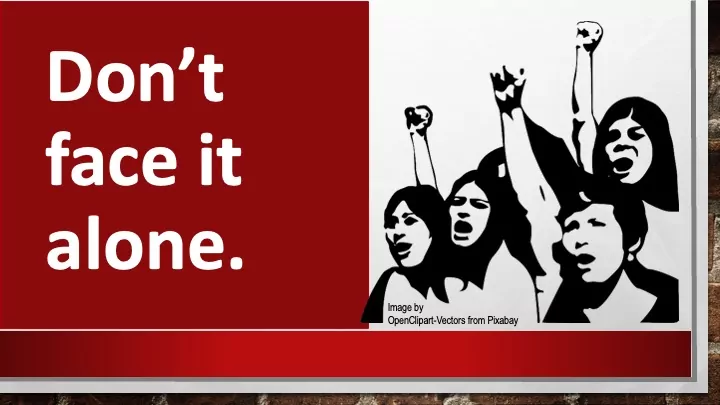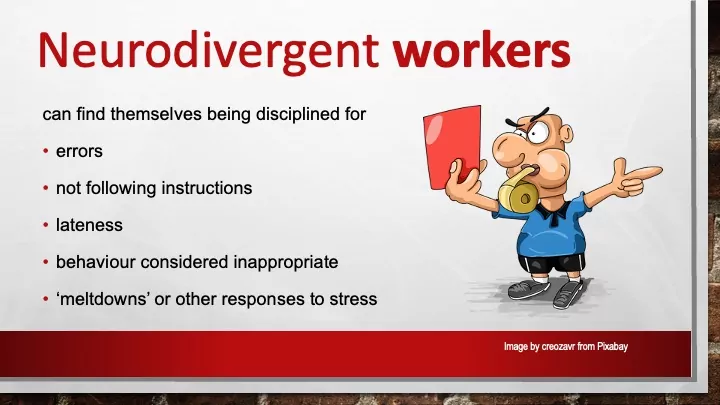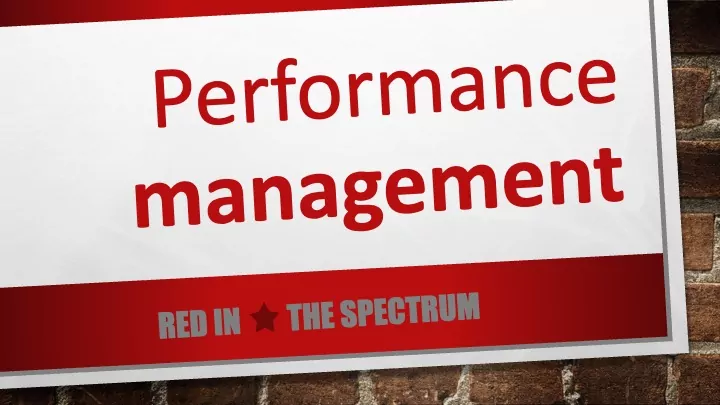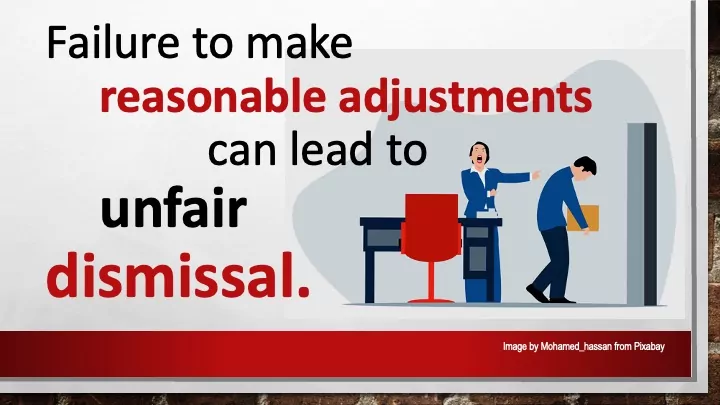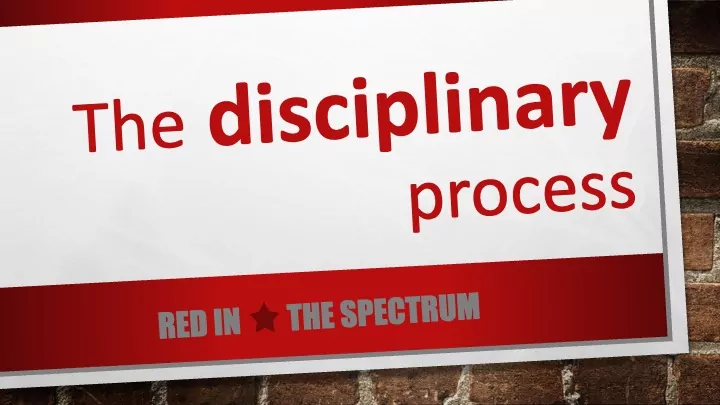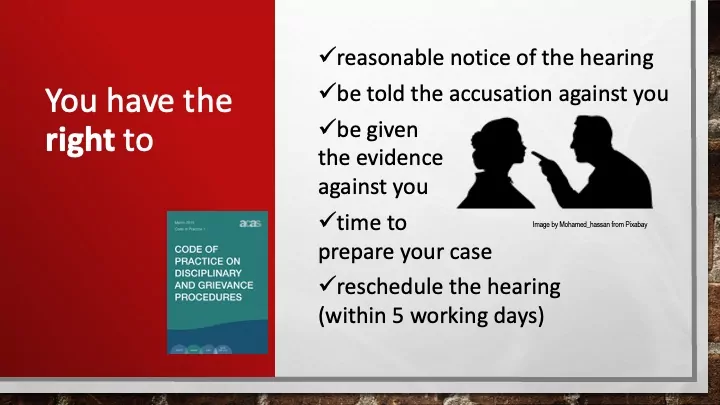Discipline, attendance, performance management: Webinar 5
Discipline, attendance, performance management
On Sunday 11 February, the fifth of Red in the Spectrum’s series of ten Sunday evening Neurodiversity at Work webinars discussed discipline, attendance and performance management.
This post contains all the material about discipline, attendance and performance management that we presented in the webinar, and some of the contributions from participants.
Barriers and discrimination at work can cause neurodivergent workers to:
- make mistakes
- perform below their best
- behave in ways that employers deem unacceptable
- withdraw from work activities
- become unwell and take time off sick
Employers may then invoke procedures, such as discipline or performance management, against them.
- How does this happen?
- How can workplaces prevent this?
- How can neurodivergent workers get support when faced with these procedures?
Discipline, attendance, performance management:
Don’t face it alone.
Get representation.
- You have the right to be accompanied to hearings by a trade union rep or workplace colleague.
- Your union rep can provide guidance and help prepare your case.
- Are there any comparable cases?
Q: What if there is no union where I work?
A: Every worker can join a union, even if there is currently no union where you work. You can join and receive support as an individual with discipline, attendance, performance management and other issues, and you can help the union to organise by persuading your workmates to join too.
What is the issue?
- Disciplinary procedures are meant to improve performance, not punish.
- Have others been affected by the same issue?
- What is the collective, underlying issue?
- What workplace change would prevent the problem arising?
Mobilising support
- witnesses
- character references
- workplace campaign
- industrial action?
Discipline
Neurodivergent workers can find themselves being disciplined for
- errors
- not following instructions
- lateness
- behaviour considered inappropriate
- not meeting targets set by performance management
- ‘meltdowns’ or other responses to stress
Francis
made clerical, spelling and filing errors at work. But his managers ignored his dyslexia and dealt with the errors as disciplinary and capacity (performance management) issues.
Even when Francis was identified as dyslexic, managers chose to ignore expert advice.
Colin
is dyspraxic and works as a railway station cleaner.
Most of his workmates rely on written instructions, while Colin works better if things are explained to him.
His boss did not do this, so he ended up misinterpreting written instructions, getting things wrong and then getting disciplined
Poll: Have you been subjected to disciplinary proceedings by an employer?
Yes, and I was dismissed. 17%
Yes, and I was given a sanction but not dismissed. 22%
Yes, but no action was taken. 22%
No. 44%
Sickness absence
Many employers discipline staff for taking time off work sick, even when this is medically certificated.
Difficulties experienced by neurodivergent workers may lead to ill-health and absence from work:
- stress-related illness caused by overload, sensory distress, bullying etc.
- physical injury related to eg, dyspraxia, tics.
Davie
was a railway boundary inspector and had no problems with work until the company changed the way he recorded data. He struggled with this, but was unsure why.
Davie went off sick with stress, sought help, and was diagnosed as dyscalculic. He and his union rep met his manager, agreeing for Davie to have a phased return, during which he received support in the new ways of working.
Wells v Great Yarmouth High School
The school sacked a worker for sickness absence caused by depression and anxiety.
The Tribunal found that his sickness was linked to his autism, and that sacking him was not a proportionate means of achieving a legitimate aim, so it was unlawful discrimination arising from disability.
Willow
is dyslexic and dyspraxic. Her employer did not apply Occupational Health’s recommended adjustments. She went off sick with stress.
Willow was placed under disciplinary investigation, and put on half pay then no pay.
Her union rep demanded that the employer drop the disciplinary action, which they did. The rep applied for disability leave, and got her lost wages refunded.
Has work made you sick?
Was this related to your neurodivergence? Tell us what happened.
Work didn’t accept the GP’s recommendation of a phased return.
Went off sick with stress waiting for reasonable adjustments and a grievance appeal meeting.
The first time I was assessed by an Occupational Health adviser (when my job in a branch of the scientific civil service was on the line), she said “I can see that you have every reason to be stressed and unhappy, but I can’t diagnose you with stress – you don’t present a barn-door case [ie. a very obvious diagnosis].”
Yes. I was bullied and I didn’t understand what was happening. I ended up going off sick for six weeks then only realised what happened when I started to heal. My manager used to speak in unclear ways. I needed to understand her hidden messages and I couldn’t due to autism and ADHD, I burned out from the stress and spent the next four months in bed!
Yes, currently off work, dealing with burnout. I asked for a reduction in hours back in August and it has still not happened. So still struggling.
Multiple burnouts at different jobs from stress and refusal of adjustments for ADHD/autism with co-occurring chronic fatigue. This has led to disciplinary and dismissals / non-renewal of contracts.
Proven unfair dismissal with trade union support and agreed a settlement days before tribunal (Non-Disclosure Agreement gag unfortunately).
I was discriminated against by a manager while he was giving me a promotion. It triggered a breakdown and I was off sick for months leading to being reduced to zero pay.
I’ve been off since June. A new company came in and told me that they understood autism, which was nonsense. Major changes occurred without warning and they wondered why it caused a major shutdown.
Work piled too much onto me. Overload as couldn’t do it all properly to my standard, they wanted less quality and I just can’t do that
The perceived discrimination, of redirecting work away from me and an inaccessible workplace, are causing me stress, depression, burnout. I went to Occupational Health about my mental health, and asked for an adjustment meeting, but I don’t think anything will be done or addressed until I hand in the adjustment requests. My boss isn’t checking in with me.
I believe I was left in burnout after my boss dragged me back to the office after I had been working from home for 15 months in lockdown. They refused my request to keep working from home. My job was literally just sending emails.
This changed at work after the pandemic. I ended up suffering from autistic burnout and that was the beginning of the end.
I was recently off sick due to stress resulting from sensory overload. I am now am back at work and still awaiting my return to work interview.
Stress overload. Burnout. And meltdown in front of my boss due to the stress and burnout linked to ADHD and autism.
Yes. Cannot go into details, alas.
Performance management
At this point, the webinar enjoyed a poetic interlude, with an ode on the subject of performance management. Click here to read the poem concerned!
Performance management issues
- Neurodivergent workers may ‘under-perform’ because of workplace barriers.
- Reasonable adjustments can improve performance; their absence can harm performance.
- Performance management targets: one size fits all?
- The procedure may discriminate against neurodivergent workers.
Simon
was told to take his train out of service at short notice. When he took the train into the sidings, he passed a signal at danger.
A manager asked him why, but did not say how much detail he wanted in the answer. Simon was anxious and talked a lot, and said that he is autistic.
The manager decided that this was the reason for his driving error, disregarding all other factors.
Simon was ‘stood down’ from driving. His union rep insisted the case was reviewed, and a cognitive assessment showed that Simon could drive trains.
The process took nearly two years.
Lauren
“My job had been going OK, but then I joined another team and I wasn’t very happy. I found it rather cliquey and felt excluded socially.
“My boss marked me down as ‘under-performing’ and ‘needing improvement’. A new manager put me on a formal improvement plan.
“My performance had been badly impacted by the environment I was in. She gave me a research project to do but I was left on my own to do it with no-one to turn to for advice. I made a bit of a mess of it.
“They terminated my contract.”
Syed
“A particular manager bullied me. He has an inner circle of people who are treated with favouritism. But I keep myself to myself and just get on with my work; I don’t go to the pub.
“He would instigate fact-finds and disciplinary proceedings for the flimsiest of reasons. I would achieve my targets but he’d give me a ‘2’ on purpose, then he put me on a Performance Improvement Plan.
“My GP recommended that I be allowed to work from home, but they refused.
“I had a breakdown, and was off work for about six months.”
What is your experience with performance management?
I did manage to get an out-of-court settlement for disability discrimination, but this was after my trade union had refused to support me because I’d been dismissed during probation – I had to rely on someone from the Citizens Advice Bureau. [Note from Red in the Spectrum – This is a disappointing response from a trade union. In similar situations, a trade union might well offer support.]
I was once kept on probation for an extra six months. They weren’t too happy when I handed in my notice some time later and only had to give one week’s notice due to being on probation. Apparently, this was “disappointing”.
Line manager saved me from a performance management review themselves by writing a list of ‘reasonable adjustments’ for me. Top of the list was ‘NAME will keep both feet on the floor at all times’ – this was to make me look more normal, because everyone wants to look normal so it’s to help me. Even HR couldn’t keep the look of horror off their face at that one.
Performance management is too often used negatively by management as a tool to dismiss staff rather than to resolve issues to retain ND employee. HR is often disablist. Trade union support is the strongest bet to keep job, but again once it gets to formal grievance it’s sadly probably too late to resolve the situation.
Bullied, as I didn’t fit in and performance management was that I wasn’t a team player and that I needed to develop. I asked for specifics, but just wasn’t given any, so didn’t know what to address or how. Caught between rock and hard place. Wanted his mate in my role. Overtook my life.
I tend to clash with managers who want to judge me by their idea of performance. I have left it been dismissed from most of my jobs because of this.
At my six-month probation review, negative feedback was out of the blue, mainly in communication and getting ‘out of my comfort zone’. Lots of issues with me not knowing unwritten/spoken requests. All very much verging on issues directly liked to autism. I replied to my boss’ comments, explaining how this isn’t fair, how I feel, and giving examples of how I actually DID do the things they said I hadn’t. my boss never replied or addressed it.
Two of my dismissals happened during the probationary period, so things never got that far.
The performance management improvement plan didn’t come with all the adjustments suggested by occupational health, it only came with demands. It seemed designed to make me fail, and to give them a reason to dismiss me. There was no acknowledgement that a newly-diagnosed person needs time to figure out what adjustments work, before they can “improve their performance”.
I remember working as a student and had called in saying I wasn’t going to attend work because all my work was done. I was disciplined and told that I should come in anyway and make myself “look busy” if I didn’t have any work to do. So malicious compliance was my go-to and I worked on school work whenever I didn’t have something to do.
My employer has a quite a complex form to complete, it takes ages. I suspect sometimes colleagues have asked behind my back to include objectives for me without discussing them with me.
It was awful and based on the medical model. It was before I was diagnosed autistic, but the employers assumed I was ‘misbehaving’ on purpose.
I keep trying to get my ‘disability aware’ workplace to consider a performance plan that isn’t inherently ableist but HR just blinks at me in confusion.
Adjustments and dismissal
Failure to make reasonable adjustments can lead to unfair dismissal.
Billingsley v Shropshire Health NHS Trust
- Employer did not implement a recommended adjustment.
- Employer did not allow enough time for another recommended adjustment to work.
- Employment Tribunal ruled this was unfair dismissal, and failure to make reasonable adjustments.
Gregson v United Response
- The employer (a learning disability charity) refused to make reasonable adjustments following care worker Mr Gregson being diagnosed as autistic, and instead dismissed him.
- Mr Gregson won his Tribunal claim.
Clarke v Marks & Spencer
- The employer unfairly fired an autistic man after a colleague complained about him leaning against her.
- He was upset due to management failing to implement agreed adjustments to manage stress.
- The Tribunal found in favour of the worker.
The disciplinary process
The ACAS code of practice on disciplinary and grievance procedures sets out statutory provisions that employers must follow. You can read it online here.
The right arising from this apply to any procedure that can lead to a discipliinary sanction, which might include sickness absence and performance management as well as disciplinary hearings.
You have the right to:
- reasonable notice of the hearing
- be told the accusation against you
- be given the evidence against you
- time to prepare your case
- reschedule the hearing (within 5 working days)
- have proceedings take place in work time
- be accompanied by a union rep or workplace colleague
- put your case, ask questions, answer allegations
- appeal the outcome
- reasonable adjustments
Removing discrimination
Modifying a disciplinary procedure is on the list of reasonable adjustments that the Equality and Human Rights Commission (EHRC) lists in its statutory Code of Practice. Examples include:
- relaxing the triggers for sickness absence warning, or excluding disability-related absence
- dyslexia-friendly format for documentation
- Kumulchew v Starbucks: Disciplinary document was provided in handwriting in an extremely small font and single-spaced; found to be unfair
- extra time to read documentation and prepare case
- not using a target approach in performance management
- representation at all stages, not just those required by law
Some you win, some you lose
Morgan v Buckinghamshire Council
- autistic / dyslexic worker dismissed for giving gifts to a child outside the rules
- argued that she did so because of her autism
- lost at Tribunal and appeal
Following this webinar on discipline, attendance and performance management, there are five more webinars in the series – you can attend whichever ones are most interesting and relevant to you.
Whether you attended this week or not, we hope to see you at some point over the next five weeks.
Next week’s webinar is on Neurodivergence and other identities. Register here.

